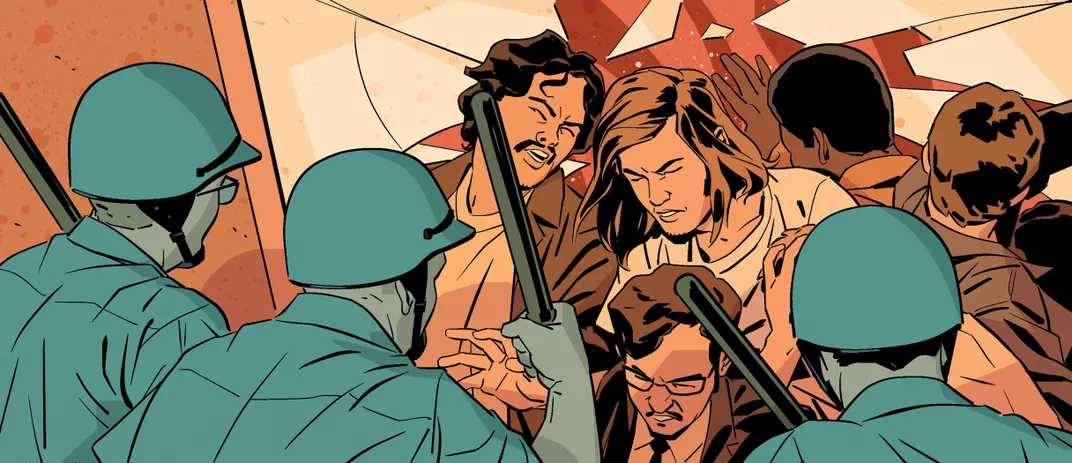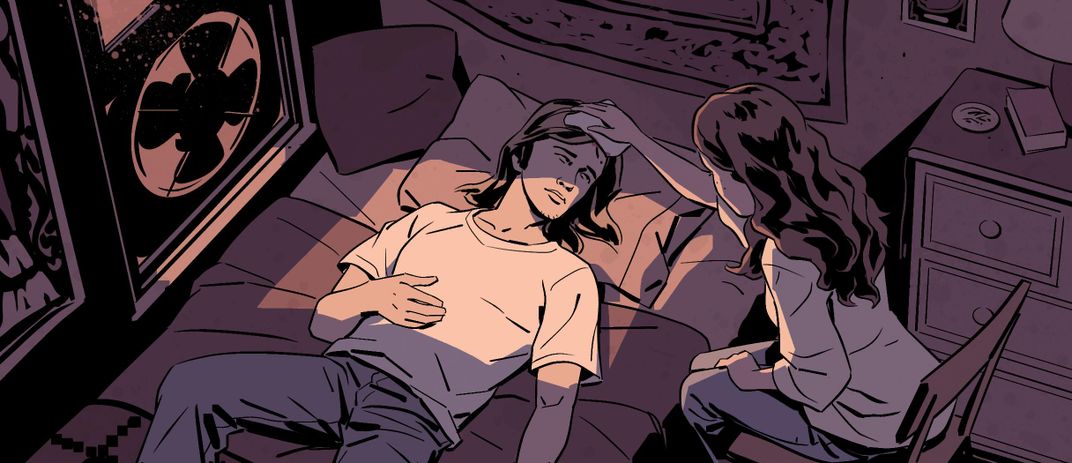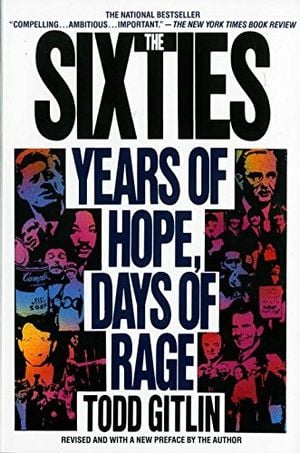Rage Against the Machine
A short story reimagines the riots at the Democratic National Convention in Chicago and the chaos that shocked the world
/https://tf-cmsv2-smithsonianmag-media.s3.amazonaws.com/filer/dd/e8/dde8b136-4649-4944-bf64-588942b12e2f/janfeb2018_k01_chicagoconvention1968.jpg)
When Todd Gitlin went to Chicago at the end of August 1968 to join the protests outside the Democratic National Convention, he told friends he was going “with the instinct of the moth for the flame.” Political activism was nothing new for Gitlin, a 1959 graduate of the Bronx High School of Science who had been part of the New Left since his sophomore year at Harvard. In 1963, he’d been elected president of Students for a Democratic Society, a national campus organization that stood against the Cold War and for civil rights and participatory democracy. Now he was a writer for the San Francisco Express Times, a counterculture tabloid that covered radical politics.
But Gitlin looked toward Chicago with a sense of foreboding. The assassinations of Martin Luther King Jr. and Bobby Kennedy had unleashed a new rage in young activists, and Chicago’s mayor Richard J. Daley was determined to curb them. Crowds of up to 10,000 protesters gathered, with some taunting police and hurling rocks and concrete, and 23,000 police and National Guard soldiers descended, spraying mace, blasting the streets with tear gas, and chasing young activists with their billy clubs. The riots were broadcast around the world, along with the protesters’ chant: “The whole world is watching.”
The demonstrators might have appeared to be unified, but they weren’t. While some members of the New Left movement had thrown themselves behind candidate Eugene McCarthy, others were doing their best to sabotage the entire proceedings. Many in the New Left were appalled by the empty theatrics of the Youth International Party. “The Yippies announced their existence at a stoned New Year’s Eve party at the dawn of 1968, and it became a major media event,” recalls Gitlin, “even though there were only a handful of people at the party.” The Yippie leaders’ outlandish threats had dominated news coverage. “When Abbie Hoffman and Jerry Rubin declared that they were going to drop LSD into the Chicago reservoir and send women to Chicago to seduce delegates, Mayor Daley’s administration took this stuff seriously. It became front-page news.”
After the convention, public opinion polls confirmed that most Americans had sided with the Chicago establishment. The mayor claimed he’d received 135,000 letters of support and only 5,000 letters opposing his forceful tactics. Two months later, Richard Nixon was elected president.
Gitlin, who spent the convention writing a daily wall paper distributed to protesters, went on to write 16 nonfiction books, including The Sixties: Years of Hope, Days of Rage. He also became a professor of journalism and sociology and chair of the PhD program in communications at Columbia University, where he also teaches a class on the 1960s. Recently, he’s been working on a novel about the era, called The Opposition, in an effort to convey some of the ineffable “currents of feeling, of sensibility, even of collective unconscious that you can’t write about while confining yourself to established fact.” Below is an excerpt in which a character called Matt Stackhouse, who is the son of a Chicago minister and has been part of the New Left since the early 1960s, experiences the full force of the convention’s chaos.
**********
Matt Stackhouse strolls into Lincoln Park, where several hundred people have gathered for a concert, but the cops are not in a festive mood. They start cruising back and forth in their three-wheeled motorcycles, scowling. A kid standing nearby, long brown hair tucked under a headband, yells, “Fascist pig!” and a cop swipes at the kid with his nightstick, while the kid shouts, “Far out, far out,” to no one in particular, and then “You see that?” and then “You believe this? Wait till your kid finds out what you do for a living!” The cop smirks, flashes a “V” sign, then folds his index finger down, leaving his middle finger raised.
Matt has seen enough to confirm his sense of what’s building up. He’s not in the mood for whole-hog confrontation, at least not yet. He’d rather pretend that this is a quiet summer afternoon and he’s out on his own, so that, as twilight arrives, shaping up luminous, he strolls westward out of the park into Old Town.
In this mood of ease and reprieve, Matt makes his way to a fourth-floor walk-up where he has been assigned a bed. Two handsome young McCarthy supporters greet him with a cheery “Good timing!” They are just on their way out, wearing white armbands with red crosses, medical students about to get organized as medics, and point out a serviceable futon on the floor, and towels, and urge him to make use of an electric coffee pot and refrigerator, which, on inspection, is bare of everything but ice cream, strawberry jam, a bag of bagels and bunches of carrots.
Matt makes do with the carrots. When he takes off his jeans before lying down, he notices the pamphlet in his back pocket. A rail-thin black man in a three-piece suit had handed it to him near Lincoln Park, and now he sees that it’s the Book of Revelation (with Tyrannosaurus rex on the cover cast as the Beast of 666), which, come to think of it, he doesn’t remember having ever read cover to cover. So he leafs through it now, in wonderment that John of Patmos, or anyone, ever was so whacked out as to write such a gush of monstrosities, about the throne of God, the great thunders, the earthquake, the angels bearing sickles and the angels bearing plagues, the trumpets that herald the end of time, the sea of glass and the sea of fire, the whore of Babylon rewarding accomplices with the blood of saints and prophets, and all the nations that drink of “the wine of the wrath of her fornication,” and finally, in deliverance, the Word of God, the King of Kings, Lord of Lords, astride a white horse, bringing a new heaven and a new earth, and the end of all night.
Flares streak through a pressure-cooker night as Chicago’s festival of misrule and chaos churns through the park and into the streets. One cascade of adrenaline smashes into another. The joy of order collides with the joy of chaos. Complexities are stripped down to simplicities. From all the mad spirits loosed in America, the essences distilled from hot vapors plunged into the cold and from all the dinner-table showdowns and this-far-and-no-farther battle cries, Chicago is the bleeding incarnation.

**********
When the Democrats had last held a convention, in 1964, it was Lyndon Johnson’s convention. Matt and the rest of the outsiders, watching on TV, had been revolted by the party honchos patronizing the Mississippi Freedom Democrats, the mostly black opposition who were palmed off with a so-called “compromise,” which gave them two honorific at-large seats instead of being welcomed as the legitimate Democrats they truly were.
The Democratic Party murdered ideals, and it was the outsiders who commanded hope. Watching Johnson interrupt a live TV broadcast to make a trivial announcement just to rip the spotlight away from a heroic, beatific sharecropper named Fannie Lou Hamer, who at that moment was giving the Democrats’ credentials committee the plainest and most vivid testimony about Mississippi brutality—this was one of those revelatory moments when the sharpest of lines were drawn.
During the crazed, hopeful-desperate, manic-depressive spring of 1968, a whole haywire history took over, swallowing everyone alive, and whether something decent might come out of all this pain, no one knew, though there were times when it seemed barely possible. When Johnson announced at the end of March that he wasn’t going to run for a second term, there was dancing in the streets, party time, even in deadening Washington, and exhilaration flared up, McCarthy’s people were delirious, little had they suspected that they might actually bring down the tyrant. Then, four days later—when did you get to breathe?—King was dead and the cities were burning down. After all the killings and all the marches, all the desegregation victories, and Selma, and voting rights, and yet more killing, came the greatest of martyrdoms, which ripped out their collective guts and broke their minds, for it was the martyrdom of everything blessed and decent and smart that King stood for.
The Sixties: Years of Hope, Days of Rage
Part critical history, part personal memoir, part celebration, and part meditation, this critically acclaimed work resurrects a generation on all its glory and tragedy.
And then Johnson was starting peace talks in Paris, to give Hubert Humphrey some cover, and then the night of June 5, when Sirhan Sirhan fired a bullet into Bobby Kennedy’s brain.
And still, interminably, there remained the war, and unhinged America. Out of a great convulsive sea came the wave of history—everyone was engulfed—there was no free ride. Thunderous waves—anguish—thrills—shattering worlds—shattering you. As it rumbled toward shore, you were lifted, and after a few seconds of lightness you were hurled to the bottom, gasping for breath, unsure which way was up, and then out to sea.
**********
Matt, in a sweated-up white shirt, tries to keep his head, his vision blurring, throat raw and tormented as if he has swallowed razor wire. He stops to dampen his handkerchief at a water fountain and is just rolling it up to hold over his nostrils.
Crossing the clotted street toward the Hilton, where the gas is thinning but the bodies closely packed make the atmosphere viscous, it takes a while to realize that they’re surrounded by cops, hundreds of cops, pressing in from three sides, no exit. A few yards behind them, a forest of billy clubs is flailing. One cop winds up like a pitcher on the mound before smashing downward. Matt scrambles not to lose his footing as he’s pressed steadily forward by the great crowd beast, inch by inch toward the big window of the Haymarket Lounge in the Hilton, waits for something to happen to avert the inevitable crush—will he be trampled?—hears the loud crack of glass smashed, as if in slow motion, sees a young man in a cowboy hat pushing his way inside, or being pushed, it’s hard to tell, and now cops like mad bulls are charging into the Haymarket Lounge, so that he has no choice but to let himself get shoved inside, too, taking a glancing blow on his shoulder from a club. Inside, people lie on the floor bleeding from head wounds, whether from broken glass or billy clubs is not clear, and shrieks ricochet as if they are ripples in one unrelenting scream, so as time resumes, goes regular again, he clambers out of the lounge and through a thinning crowd of demonstrators mixing with delegates and delegates’ wives and tourists and God knows who else, into the lobby, where thinning wafts of tear gas are joined by something more putrid—stink bombs set off by the radicals, he will later learn. Everyone looks bewildered and panicky, no one more than the well-dressed Democrats.
He scrambles back out onto Michigan Avenue and flees to the left, northward. The air is less viscous here, more like oxygen, easier to breathe, but Matt has to blink a lot, trying to see straight. The window of the Haymarket Lounge is completely shattered, people are writhing inside, there are occasional screams. He keeps running.
**********
That night, a mile to the north, one flare, then another, then a third flare and a fourth, rocket into the blackened sky over Lincoln Park. A helicopter smacks the air over their heads and launches a beam to illuminate the grouplets fleeing the National Guardsmen incoming to drive them out of the park. Pools of light from the headlights, a war-of-the-worlds look, gas grenades flying, the gas making halos around strobe-lit figures of coughing, earthbound angels. A longhair goes down from a nightstick in the head, and starts crawling, senselessly, and when he sees a flash camera shooting him, makes sure to raise his fingers in a V and grin, whereupon the cop turns on the cameraman, smashes him, and leaves him flailing around on the ground, and then turns around to see who’s watching, catches sight of Matt and barrels toward him, jabbing his nightstick toward his midsection. That’s when Matt spots a familiar face in the crowd—freckles, green eyes and all—looking aghast.
He hasn’t seen Valerie Parr since college and he’s forgotten how lovely she is, but she also looks more fragile. After a kiss as warm as the moment permits, they speed-walk out of the park, holding hands tightly. Looking back, they see silhouettes against the lit-up gas fumes and cannot tell whether those are demonstrators or cops. Matt is aware that he stinks. Sweat saturates his skin. The white shirt he thought might win him protection is starched to his body.
Now, some demonstrators slow down but most of the panicky crowd are closer to running than walking, running in bursts, slowing to catch their breath or tie handkerchiefs around their noses, look around and check that this is really happening, then start running again. Spears of light ignite the McCarthy and Czechago buttons and the disbelieving eyes. Matt reaches for his crumpled handkerchief and, crossing the street, coughing, gagging, presses it over his nose, as park people, looming up out of the gas, drift past him like ectoplasmic emanations.
The helicopter flaps overhead again like an angry pterodactyl, and from farther down the street come other mayhem noises: glass shattering, glass crunched under tires, nightsticks against steel, nightsticks against skulls, car horns, distant sirens, sirens close-up, whoops, screams, ululations straight out of the movie The Battle of Algiers. A teenager in a headband trips and falls directly in front of Matt, who stops and helps him to his feet. “Thank you, man,” the kid says, and runs on. On the other side of the street, a bus full of cops, lights extinguished, gets its taillight smashed in by a thrown rock. The bus turns a corner, speeds up, stops short next to a knot of young people and disgorges a dozen or more helmeted officers, who gleefully rush onto the pavement to poke the ends of their clubs into the guts and groins of anyone fleeing too slowly or screaming too loud.
Matt catches the fright in the eyes of a boy caught in the beam of a police headlight that suddenly flashes on, but, transfixed by this scene, Matt doesn’t see what Valerie sees, namely, another cop bearing down on him from behind, and then suddenly blood is streaming down Matt’s sweaty face from a cut opened up in his scalp, and he thinks, this is too much. He is frozen in a tableau of immobilized rage until Valerie grabs his hand and pulls him to the sidewalk. They walk haltingly in the direction of the apartment.
“Hold on,” Matt says, pulling at her. “I don’t feel so good.”
“What?”
“Woozy.”
“Do you want to sit down?”
He leans against a wall. “No. Just woozy. Is this what a concussion feels like?”
“Let’s go back to the apartment,” she says. “Slowly.”

In the apartment, Valerie takes a washcloth, drenches it, soaps it, parts his hair, mops off the rivulets of blood, cleans off his cut.
“Your hair took most of the blow.” She pauses. “Your beautiful hair. I don’t think you need stitches. Stay away from emergency rooms. They’ll bust you for attacking a cop with your head. See how you feel in a while.”
“OK.” He collapses onto the living room mattress and she wedges a pillow under his feet. She rinses out the washcloth with cold water, holds it against his scalp. “Just hold this for a while.”
“OK.”
He feels clearheaded enough to pay attention to the freckles on her nose.
“I think I once saw this in a movie,” she says finally. “Count backwards from 100. By sevens.”
“One hundred. Ninety-three. Eighty-six. Seventy-nine. Seventy-two. Sixty-five...
“You’re fine.”
“This place has the right vibe,” he says.
“You’re quite fine.”
“How about turning on the fan?” She does. They are silent together. Whatever happens now, he has shared this reunion with Valerie Parr amid this whole insane Hieronymus Bosch scene.
With Valerie curled up next to him, her palm against his chest, Matt lies awake, clammy, into the streaky hours of dawn, listening to the drone of the window fan beating the dead air.
“Do you really feel fine?” she wants to know.
“I feel extremely fine.” Eyes closed, the fan receding into a background hum, his mind is careening, images swirling, kaleidoscopic twirl and reset, playback of lengthening shadows; and musings about what will become of all of them now that they are entering, or stumbling into, a new phase, whatever this is.
He leans his head on Valerie’s shoulder and is seized by the thought of a couple of dead-on-their-feet cops at the end of a long day, working kids over in some godforsaken holding cell, out of the spotlight, because everything in Chicago is the fault of the hippies. Honest people have had enough from these so-called peaceniks—they’ll think twice before setting their cloven hooves back in the hard-working city of Chicago, Richard J. Daley, Mayor.
A Note to our Readers
Smithsonian magazine participates in affiliate link advertising programs. If you purchase an item through these links, we receive a commission.
